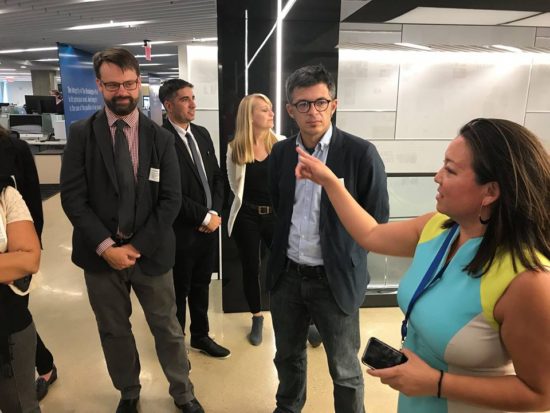
tour of The Washington Post on their fall trip to the nation’s capital.
Sitting in a hotel room watching propaganda videos from a racist hate group isn’t the way most people would spend a week in Boca Raton, Florida. But back in October 2016 issues like race, class and religion were front-and-center in a presidential campaign grinding toward its improbable conclusion.
At the time, Tracy Jan covered national politics for The Boston Globe’s Washington, D.C. bureau, a beat she’d had since 2011.
For this particular assignment, Jan spent a week in Florida writing about the growing Islamophobia that had taken root there – part of the Globe’s “America on Edge” series.
She was in her element, in a journalistic sense – even though it meant that Jan, who is Chinese American, spent her time attending hate group meetings and lunching with conspiracy theorists – all of whom were white Donald Trump supporters.
“It was cool to be able to peek into a world that was so foreign to me and write about how this hostility, fear and anger was being exploited by Trump,” Jan said over drinks this fall in downtown Washington, D.C.
When The Washington Post came calling about potential opportunities, Jan jumped at the chance to create a new beat covering the intersection of race and the economy.
As a 2015 Knight-Wallace Fellow, she studied “Morality and Money in Medicine.” In addition to covering politics, Jan was also The Globe’s national health care reporter, a role she had hoped to more fully inhabit after the 2016 campaign.
She spent her year in Michigan sitting in on confidential hospital meetings about patient care, learning about reproductive justice, medical ethics and public health. She also wrote a screenplay about Dr. Tim Johnson, chair of the U-M Health System’s Department of Obstetrics and Gynecology and his pivotal role in the national debate over an abortion procedure called “partial birth abortion” by its opponents.
But she said she came away from her fellowship year with much more than a string of story ideas, subject matter expertise and sources.
“In a larger sense, the Fellowship helped me realize that one’s ‘work’ doesn’t have to be your life,” she said. “But as journalists, we tend to make it so. So we might as well be writing about the things we care deeply about.”
Having written about health issues for several years, she felt ready for change. When The Washington Post came calling about potential opportunities, Jan jumped at the chance to create a new beat covering the intersection of race and the economy. She saw the job as a pivotal platform from which to dive more deeply into the divisions that defined the 2016 campaign and widening racial and economic inequalities.
“I like that it’s not a general ‘race’ reporting job but one grounded on the financial team, which helps me bring a bit more focus and structure to this hugely important and oftentimes unwieldy topic,” she said. “The motto here is ‘A1 or viral.’”
“I felt like I had been preparing for a job like this my entire life,” she said.
Her new beat is broad, and Jan has the freedom to choose her priorities – whether it’s a quick piece highlighting the persistent wealth gap between black and white Americans or a front page story about how Facebook disproportionately censors black activists.
“I like that it’s not a general ‘race’ reporting job but one grounded on the financial team, which helps me bring a bit more focus and structure to this hugely important and oftentimes unwieldy topic,” she said. “The motto here is ‘A1 or viral.’”
That means juggling front page or Sunday enterprise and breaking news with chattier web-only pieces to inject The Post as part of the national conversation about race.
Since the beat is new, Jan said she’s focusing on making sure that it becomes seen as an essential part of The Post’s coverage – “so eyeballs are always a consideration, as well as impact.”
Closing in on her first year on the job, Jan said she still has much to learn. She doesn’t see herself as a business “wonk.” Instead, she is focusing the sensibilities she developed covering politics and health in a new direction.
“The things I learned covering lobbying, power and influence as a political reporter should also be front and center on this beat,” she said, “because at the heart, it’s about inequality – who has and wants more, and who is left behind.”
Adam Allington is a 2012 Knight-Wallace Fellow and an environmental reporter for Bloomberg BNA
